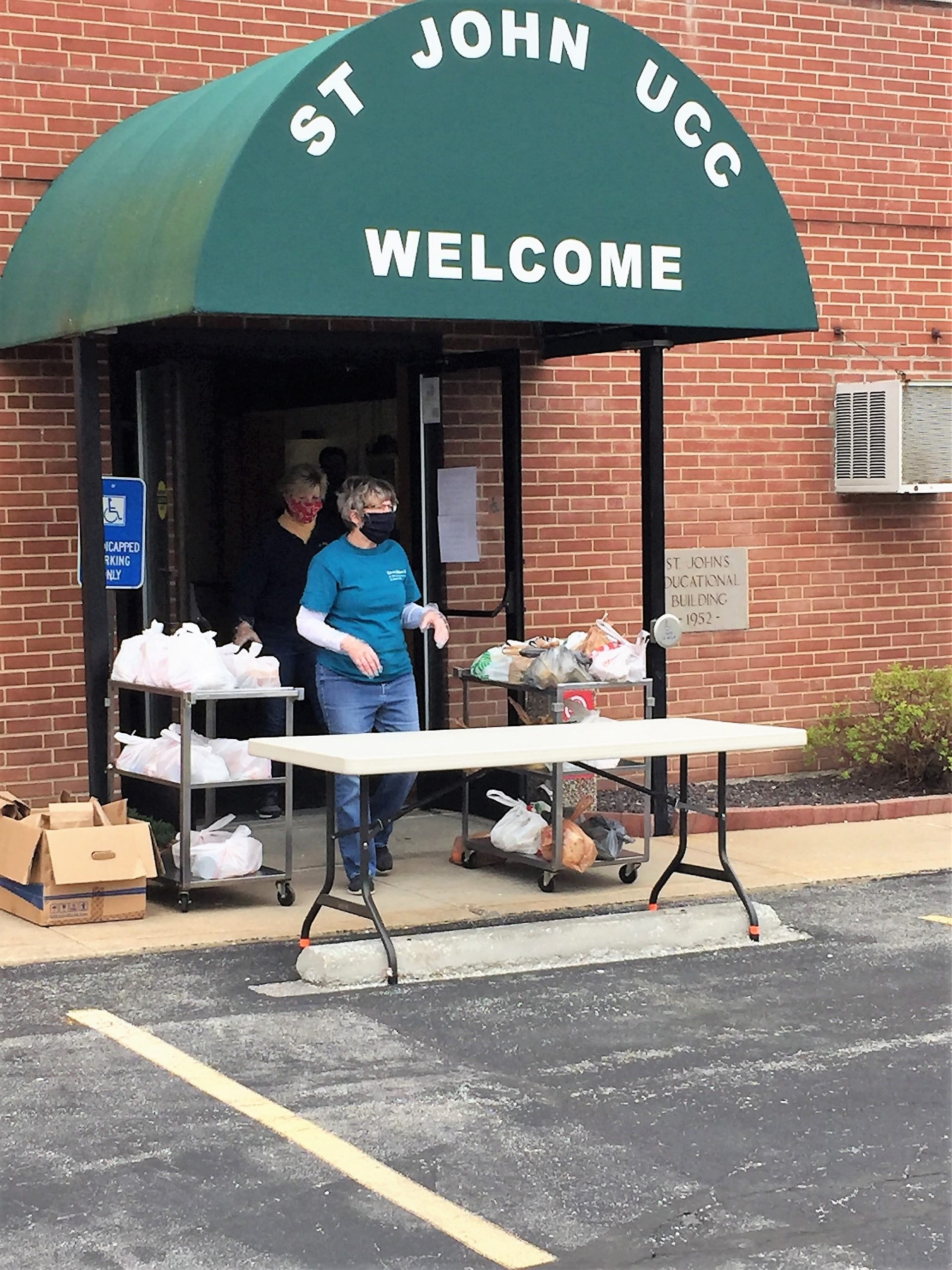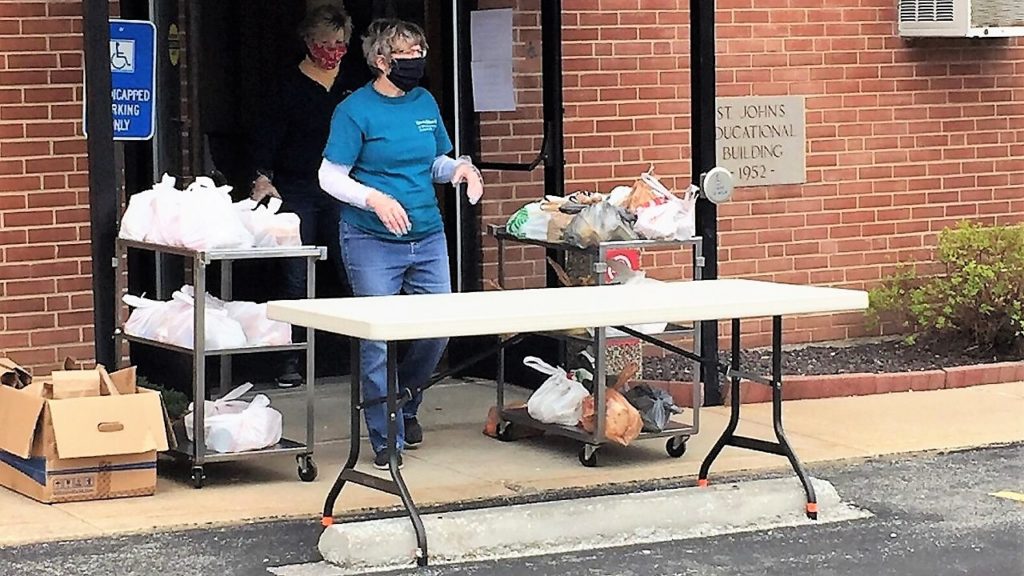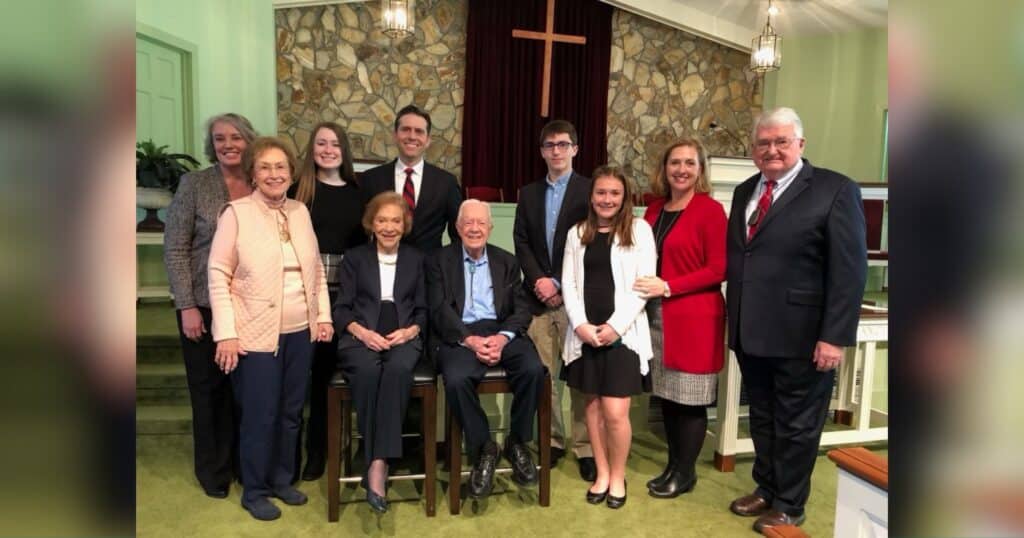Holy Saturday in Missouri: Masks, gloves, cold meals on a table
The day before Easter, in the St. Louis suburb of St. Charles, Mo., a table stood six feet in front of the parking lot door of St. John UCC. Servers in masks and gloves stepped forward, set out cold takeout meals one at a time, and stepped back. Neighbors – waiting at a distance from each other – came forward one at a time to take meals away. Nonperishable groceries were given out in this way, too.
 In more normal times, those low-income and homeless guests would come into the church each Saturday and sit down for a hot meal. It was just one of many adjustments the congregation has made in recent weeks as the pandemic began to hit close to home. By Holy Saturday, St. Charles County had 298 confirmed cases of COVID-19 and 10 deaths from the disease – not to mention the thousands more cases and hundreds more deaths in the neighboring county and city of St. Louis.
In more normal times, those low-income and homeless guests would come into the church each Saturday and sit down for a hot meal. It was just one of many adjustments the congregation has made in recent weeks as the pandemic began to hit close to home. By Holy Saturday, St. Charles County had 298 confirmed cases of COVID-19 and 10 deaths from the disease – not to mention the thousands more cases and hundreds more deaths in the neighboring county and city of St. Louis.
“In North American culture, especially among the middle class, so much of the fear and suffering and danger is hypothetical,” said the Rev. Lisa Martin, pastor of St. John. Not anymore. Fear of sickness, the sadness of not visiting relatives and friends in nursing homes and hospitals, the lingering grief cause by postponed funerals – all these were presenting what Martin described as “an opportunity to gain some insights into what all these events of Holy Week mean.”
St. John has been working hard to stay connected during the pandemic. Its pastoral staff has been checking in on members by phone “to see if everyone is okay through this crisis,” Martin said. A full page of its April newsletter lists links to live online meetings and recorded resources for children, parents, youth, adults and even choirs. Daily reflections were posted on Facebook during Holy Week, as was a prerecorded Maundy Thursday service. Martin encouraged members and families to take rituals and traditions of the season into their homes and around their tables.
But Easter Sunday couldn’t help feeling different from normal. It usually features triumphal organ music and a crowded sing-along to “Hallelujah,” the famous chorus from Handel’s “Messiah.” For Sunday’s online “little Easter,” Martin was looking ahead to what she described during Holy Week as a “running-away-in-fear understanding of the resurrection” — how Jesus’ disciples must have felt on the first Easter, “huddled in fear, not knowing who would be the next ones killed, having heard the tomb was empty and not knowing quite what that meant.”
The “Hallelujah” sing-along will happen once the pandemic passes, Martin said. “We’re going to keep that tradition and do it whenever it is that we gather,” she said. “For us, that will be Easter. That will be the moment when we’re feeling alive again.”
This is one of four profiles of how local congregations of the United Church of Christ approached the unusual Holy Week and Easter of 2020. To see the rest – as well as the gifts each of them has found in moving online – see this main article.
Related News
‘Reminded of our calling’: National interfaith leaders gathered on MLK Day to herald a hopeful path forward
On Martin Luther King Jr. Day, prominent religious leaders from across the country filled the...
Read MoreACT Alliance North America members meet, seeking to strengthen their collective work and witness
The annual meeting of the ACT Alliance North America Forum was held at the National Setting of...
Read MoreWaging Peace: UCC pastor who served in Carter’s administration remembers the President
As thousands gathered to honor the life of Former President Jimmy Carter at the Washington...
Read More


